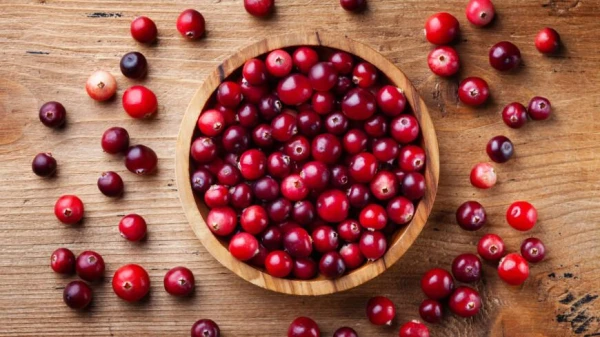
How cranberries can be beneficial for health and what ways of using them exist, explained dietitian Tatyana SOLNTSEVA.
Additional source of vitamins and trace elements. A small amount of cranberries is a valuable source of vitamins — carotenoids (provitamin A), vitamin C, PP (niacin), E, as well as the B group (in particular, B1, B2, B5, B6) and vitamin K, which is present in cranberries in amounts similar to those in green cabbage. Additionally, this northern berry is rich in important trace elements such as iron, manganese, molybdenum, copper, as well as iodine and magnesium, which play a key role in the functioning of the body, along with cobalt, nickel, and zinc.
Anti-inflammatory and antibacterial action. Consuming cranberries is beneficial for inflammatory diseases. They contain numerous biologically active compounds — organic acids (benzoic, quinic, citric, ursolic, malic, and others), as well as bioflavonoids: proanthocyanidins, catechins, and polyphenols. Although cranberries are not the richest source of vitamin C, their effect on the body is enhanced by the synergistic effect when combined with flavonoids. Due to the presence of proanthocyanidins, cranberries have anti-inflammatory and antibacterial properties, making them effective for infections and inflammatory diseases of the urinary tract. It is beneficial to consume cranberry juice and drinks based on cranberry juice during viral infections and respiratory diseases in addition to prescribed treatment. Cranberry juice is also believed to have immune-stimulating effects.
Antioxidant properties of cranberries. Due to the presence of anthocyanins, betaine, and catechins, including cranberries in the diet can help eliminate free radicals, positively influence metabolism, and slow down cell aging. Cranberries are believed to have hepatoprotective properties, meaning they support important liver functions, improve cholesterol metabolism, and have anti-cancer effects.
Cranberries also help counteract radiation and heavy metal poisoning. The pectins contained in cranberries are beneficial for people exposed to radionuclide pollution and in contact with heavy metals.
Long shelf life. Unlike other berries and fruits, cranberries retain all their beneficial properties until the end of winter due to the presence of a natural preservative — benzoic acid in high concentration. Cranberries store well when frozen. It is no surprise that they are harvested even during the first frosts. Previously, this berry was stored in barrels of water, which allowed it to retain all its taste and beneficial qualities until spring.















Leave a comment